Jonathan Chan and Shameera Lin look back on their 2018 production of Huzir Sulaiman's Atomic Jaya at the Corpus Playroom.
In Michaelmas 2018, we took a risk, pitching the play Atomic Jaya (1998) to the ADC’s panel. Written and staged by Malaysian playwright Huzir Sulaiman in Kuala Lumpur in 1998, it would have been only the second play of Southeast Asian origin to be staged under the auspices of the ADC. Centred on Dr Mary Yuen, a female, Chinese Malaysian nuclear physicist, the play follows her madcap entanglement in the Malaysian government’s attempts to develop an atomic bomb. Given some of the play’s overarching themes – nationalistic, postcolonial desires for global recognition, anxieties over nuclear weaponry, the marginalisation of women in science – we believed enough of it would be comprehensible to a broader audience, while it also brought attention to a part of the world underrepresented at the ADC.
In the summer prior, Shameera interned for a Member of Parliament in Kuala Lumpur who previously worked as an actor. Having been involved in Cambridge’s student theatre scene, Shameera found a noticeable absence of narratives in which she could recognise herself and her cultural roots. Something had to change to encourage those from Malaysian and other Southeast Asian backgrounds to participate in Cambridge theatre. She had limited knowledge of Malaysia’s theatre scene as it bears a socioeconomically exclusionary slant and hence, decided to consult the MP about his favourite bits of Malaysian theatre. Atomic Jaya immediately occurred to him, and Shameera felt an organic relatability she almost never experienced in reading other scripts. However, she was unsure of how to take things forward, given that she was the only Malaysian she knew of in Cambridge theatre and the play required certain cultural specificities in its staging and production.
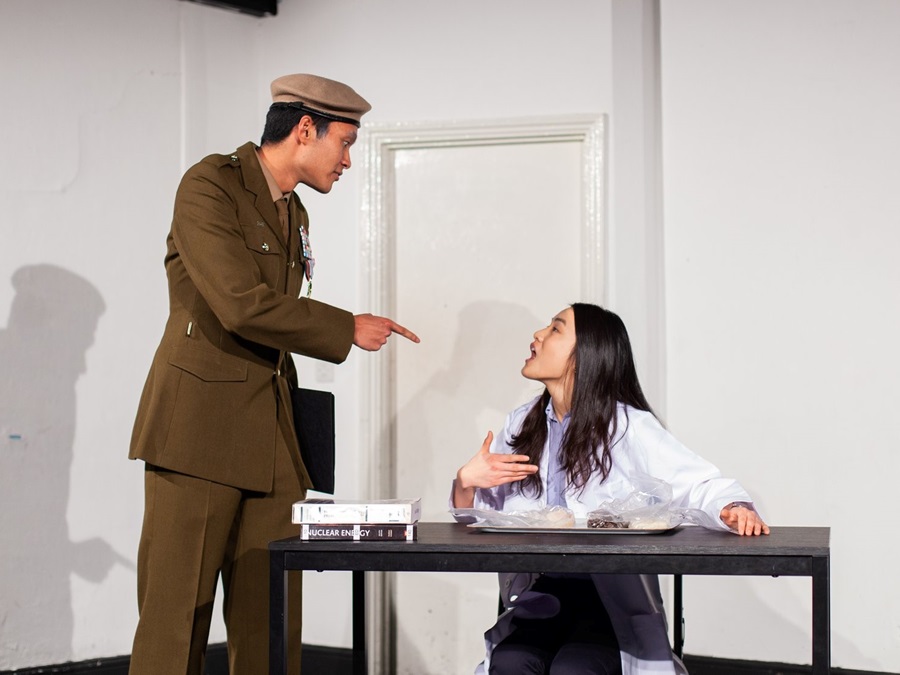
Matthew Ryan Raja Kumar as General Zulkifli and Iris Li as Mary Yuen
Jonathan, meanwhile, had served as the Publicity Head for Boom (2009) in Lent 2018, the first Singaporean play to be staged at the ADC. Having overseen its marketing as a play reckoning with postcolonial rather than BME concerns, he was familiar with ways in which plays focused on nonwhite characters bore the danger of not being meaningfully distinguished across cultural and national contexts. He convened a working group to explore plays to pitch to the ADC as successors to Boom. While they developed a short list, including Tan Tarn How’s The Lady of Soul and Her Ultimate ‘S’ Machine (1992), and Haresh Sharma’s This Chord and Others (1991) they found their cultural specificity to Singapore as impediments to drawing a broad audience.
Shameera and Jonathan previously worked together on the sketch show Second-Generation (2018) in Easter 2018 and had commiserated over the insularity we encountered on the English Tripos as international students – Jonathan is of mixed Chinese-Korean descent and grew up in Singapore, while Shameera is of mixed Chinese-Indian descent and grew up in Malaysia. While catching up at the beginning of our second year, we quickly found that each had something the other lacked with regard to the staging of a play: Shameera had Atomic Jaya in mind; Jonathan had a critical mass of friends eager to participate in a Southeast Asian production. Given that Jonathan’s father is from Kuala Lumpur, we shared an eagerness to critique and examine elements of Malaysian politics.
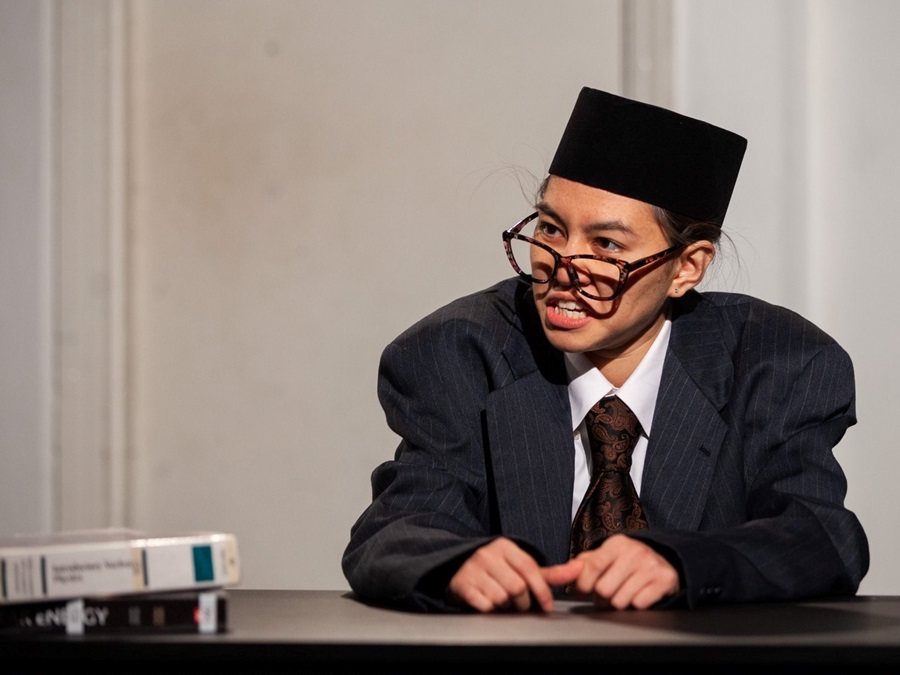
Claire Chung as the Cabinet Minister
We pieced together a pitch that articulated our vision for the play: the nuclear anxieties of Stanley Kubrick’s Dr. Strangelove (1964), the galling fashion trends of ‘90s Malaysia, the opportunity to take on the stunning return of former Prime Minister Mahathir Mohamad to power in an upset election in 2018. 20 years on, we noticed the feeling of stagnancy that accompanied the return of familiar figures to the political scene, a poignant realisation given that Sulaiman sought to satirise many of these same figures in 1998. While Atomic Jaya had initially been staged as a two-man show, what the diversity of the Cambridge student body -- as well as the constraints of the Cambridge term -- accorded us was the possibility of assembling an ensemble cast.
Our greenlight from the ADC came as a surprise and relief, and we put together our capable crew over the rest of Michaelmas. Qiu Jiayu and Arthur Tan joined us as producers, meticulously handling the play’s budget and logistics. Saad Siddiqui came onboard as our Stage Manager, overseeing costume, lighting, and set design, while also choreographing musical transitions between scenes. Lyndon Teng and Eugene Chia were our adroit first-time light designers, while Lisa Bernhardt, Emma Soh, Khai Khai Saw, and Michelle Tan managed our wacky props and set design. Leia Devadason composed an original score to the jingoistic tune ‘We’ve Got the Atomic Bomb’, and as photographers and videographers, Cayson Chong and Zhao Zijun produced not only reams of zany publicity material but also footage of our news anchors and Secretary of State. Leonard Yip and Nicole Seto, our skillful publicists, conducted an outstanding meme campaign while advertising our show to various societies for students of Asian descent, as well as the Cambridge University Campaign for Nuclear Disarmament.
All the while, we remained conscious that what Atomic Jaya would demonstrate was that theatre from Asia was not defined by melodrama. The script has a brisk energy as it piles up outrageous instances of governmental and scientific incompetence under the veneer of confidence. It was thus crucial to have a cast with solid comedic timing and a demonstrated ability for the accents demanded by the play. Iris Li was cast as Mary Yuen, a challenge as she reined in her comedic instincts to play her straight against various chaotic characters. Matthew Ryan Raja Kumar came onboard as General Zulkifli, bringing a wiry, manic energy to the general’s insecure bravado, as well as Bala, a contractor. Christian Yeo also doubled up as Dr Saiful, a gormless scientist, and Teng, another contractor. George Solomou and Artemas Cowley were our CNN and BBC newscasters, Nikhil Sundaraj our exasperated reporter from Radio Televisyen Malaysia, Emiliana Petrone played Madeleine Albright, and Riva Kapoor was Mary’s shallow best friend, Serena da Silva.
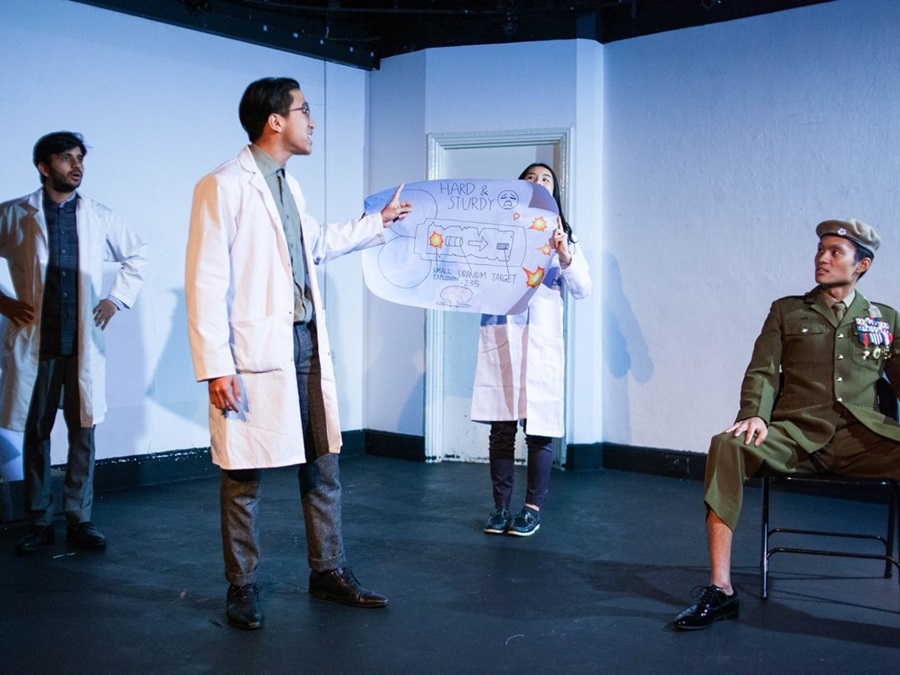
Dr Ramachandra (Dhruv Sharma) and Dr Saiful (Christian Yeo) present their schema to General Zulkifli (Matthew Ryan), with Mary (Iris Li) looking on
The remaining roles to be cast were challenging. There was a dearth of actors of Indian descent willing to play Dr Ramachandran. Some British South Asians were understandably apprehensive about putting on an accent that might have felt disingenuous or reinforced stereotypes. So, too, was it difficult to find actors of Malay descent to play Noraini, the canteen lady, and our Cabinet Minister. What saved us was a friend of Shameera’s: she suggested Dhruv Sharma, a graduate student who had previous theatre experience in New Delhi. He dazzled in his audition. Shameera was also able to persuade her friend Claire Chung, a versatile and talented actress, to play both Noraini and the Cabinet Minister. The latter, dressed in a cartoonishly oversized blazer and songkok, came to steadily draw laughs each evening with his conspiracy theories.
As a first-time director, Jonathan found it difficult to keep abreast of decisions made with regard to various elements of the production, particularly acting, sound, lighting, and costume. While having experience in writing and acting, he did not anticipate the breadth of focus and attention the task required. Shameera, while more seasoned in student theatre, had to take rehearsals off as she tended to unexpected health issues. As with every production, there were invariably frustrations as we made decisions, working around the constraints on our cast and crew imposed by their respective extraneous commitments.
Nevertheless, we were grateful to see the production come together, especially in more complex sequences such as a musical number, the interspersing of video clips projected on the walls, and the dancing accompanying our roster of musical transitions. These included Dolly Parton’s 9 to 5, Noraniza Idris’ Dikir Puteri, the theme song of Singaporean sitcom Phua Chu Kang, and Grasshopper’s Broken Heart Club. There were moments where we were unsure whether our efforts would pay off, but it was rewarding to see people who may not have ordinarily had the confidence to get involved in theatre working fastidiously to memorise their lines, perfect lighting transitions, and assemble props.
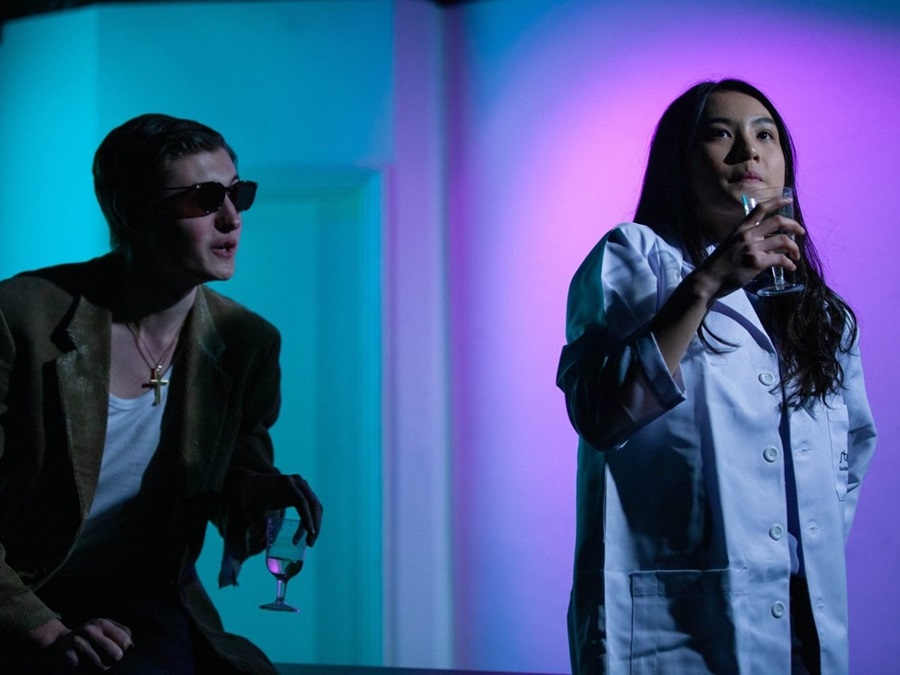
George Solomou as Russian dealer Otto and Mary.
On our first night in March 2019, we were cautiously optimistic as to how those in the audience who were less familiar with the play’s beats might react, and even prepared a glossary for people to peruse before the play slipped into its rapidly-paced dialogue of English, Malay, and Cantonese. As the production went on, we felt that apprehension melt away: people responded well to the shadow cast by nuclear warfare, the comedic incompetence of every character except Yuen, the zaniness of our musical transitions, and the absurdity that throbbed throughout the entire play. It was particularly gratifying to receive positive reviews from both Varsity and The Tab, a welcome affirmation of our efforts to bring a Southeast Asian comedy to the ADC.
With hindsight, Atomic Jaya remains a highlight of our time in Cambridge, one we often reflect on in our conversations. There is great satisfaction in knowing we achieved what we’d sought to achieve: a greater visibility for a range of stories from around the world. It was our hope that our show would embolden BME and nonwhite students to pitch plays that better reflected the circumstances in which they were brought up. The establishment of Bread Theatre and Film Company helped to carve a new path for BME and nonwhite students to break into the theatre scene. Plays such as Chong Tze Chian’s Pan Island Expressway (1999) and Jamie Hancock and Shameera Lin’s Corpsing (2020), both staged in Lent 2020, drew on the legacy of Atomic Jaya as former cast and crew returned to partake in both productions.
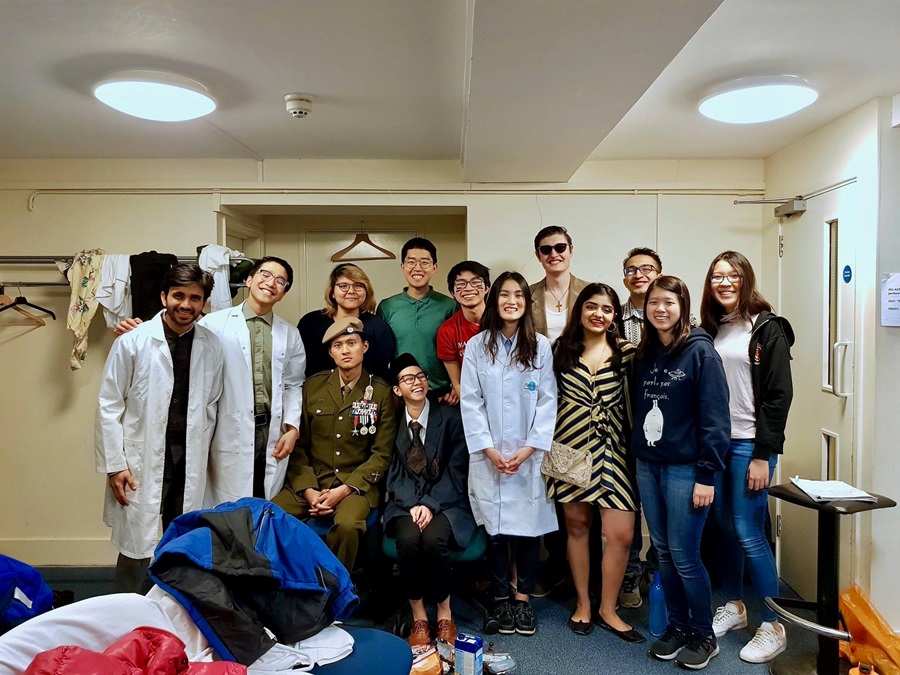
Cast and crew on the show’s final night.
Almost two years on, having graduated into a world that looks drastically different and returned to Asia, we remain grateful for the part we played in helping people envision a place for themselves in the ADC.
For Jonathan, the experience of directing Atomic Jaya has deepened an awareness not only of the domestic challenges that led his Chinese Malaysian relatives to emigrate, but also of the many cultural entanglements between Singapore and Malaysia. Huzir Sulaiman, who wrote Atomic Jaya, is himself based in Singapore and continues to monitor developments in his home country. Similarly, a greater familiarity with Malaysia’s political concerns has enriched Jonathan’s conversations with Malaysian family and friends, while also deepening a sense of a regional consciousness within Southeast Asia.
In Shameera’s case, her views on Atomic Jaya have evolved after returning home and engaging in conversations amongst Malaysian creatives. It appears to be a budding sentiment amongst younger generations that Atomic Jaya is dated, envisioning a Malaysia that has become less recognisable in 2020. Still, she believes it is a crucial script in opening up the possibilities that are to be in Malaysian theatre. She hopes that one day, other Malaysian students will find plays that represent contemporary Malaysia with greater relevance.
What remains is that the present tumult of Malaysian politics, itself complicating their response to COVID-19, has invariably meant that Atomic Jaya has not been too far from our minds, even if an atomic bomb is not the best analogy for a global pandemic.

ADC Archive aims to collect and share your memories and personal experiences of the theatre. Whether you are a current student, alumnus, former employee, or patron of the theatre, we want to hear from you! To submit your story, or for more information, please send an email to archive@adctheatre.com. To view other submissions to the archive you can click here.
Whilst you are here
As with other theatres and small arts venues up and down the country, closing our doors has had a significant impact on our financial position. If you are able to consider making a donation to the ADC Theatre please click here.

